Ethical Challenges in Research: Ensuring Project Success Report
VerifiedAdded on 2023/06/12
|7
|1609
|98
Report
AI Summary
This report delves into the ethical questions and concerns pertinent to research projects, emphasizing the importance of participant rights, informed consent, and minimizing harm. It addresses key principles such as voluntary participation, confidentiality, and anonymity, highlighting the need for Institutional Review Boards (IRBs) to ensure ethical compliance. The report underscores the reasons for adhering to ethical standards, including promoting truth, fostering collaboration, ensuring accountability, building public support, and upholding social values. It outlines strategies for obtaining informed consent, addressing potential causes of harm, and ensuring confidentiality and anonymity in data collection. Finally, it discusses contingency plans for situations where sufficient data cannot be collected, emphasizing the importance of re-evaluation and referencing similar projects. This resource is available on Desklib, where students can find past papers and solved assignments.
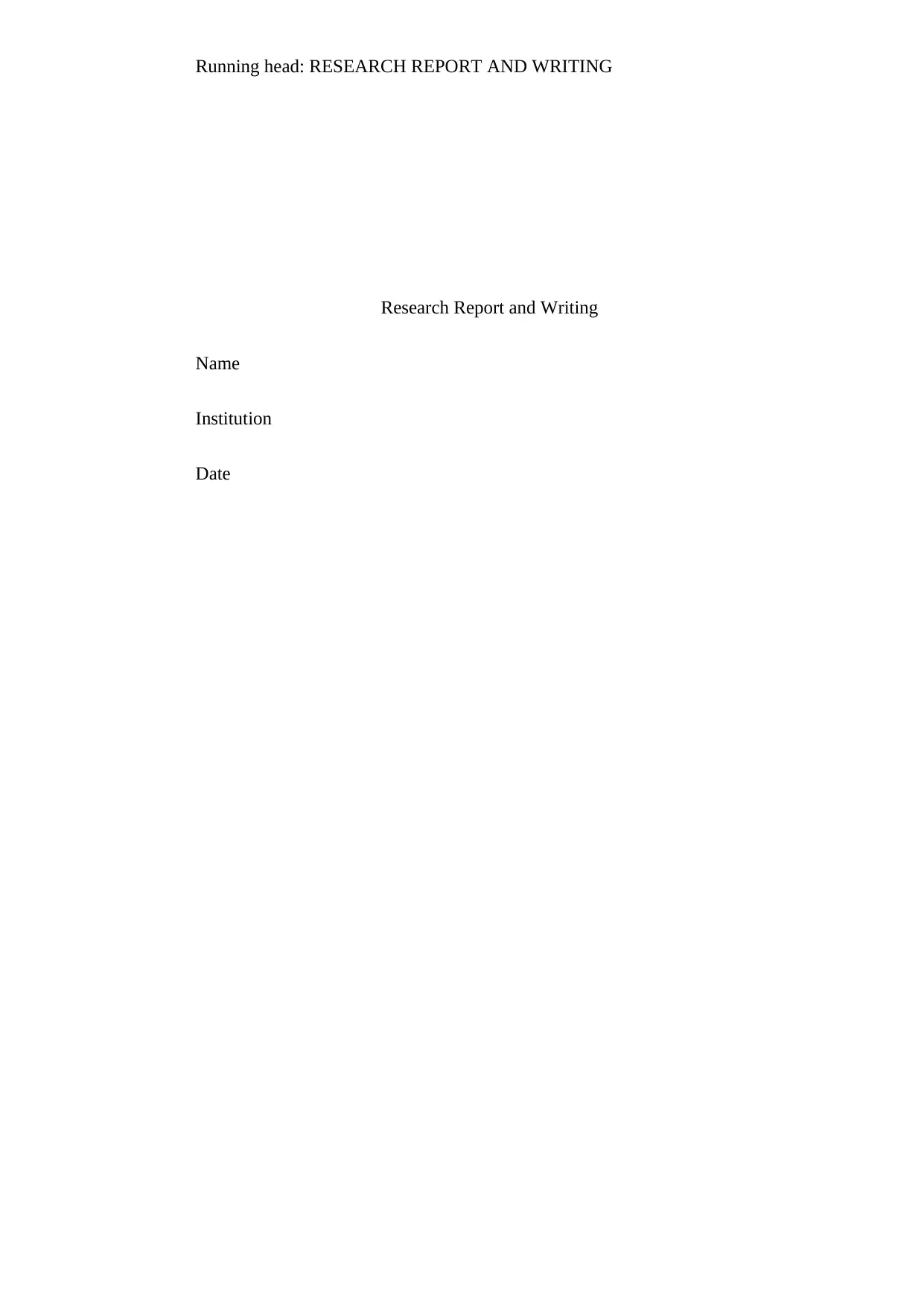
Running head: RESEARCH REPORT AND WRITING
Research Report and Writing
Name
Institution
Date
Research Report and Writing
Name
Institution
Date
Paraphrase This Document
Need a fresh take? Get an instant paraphrase of this document with our AI Paraphraser
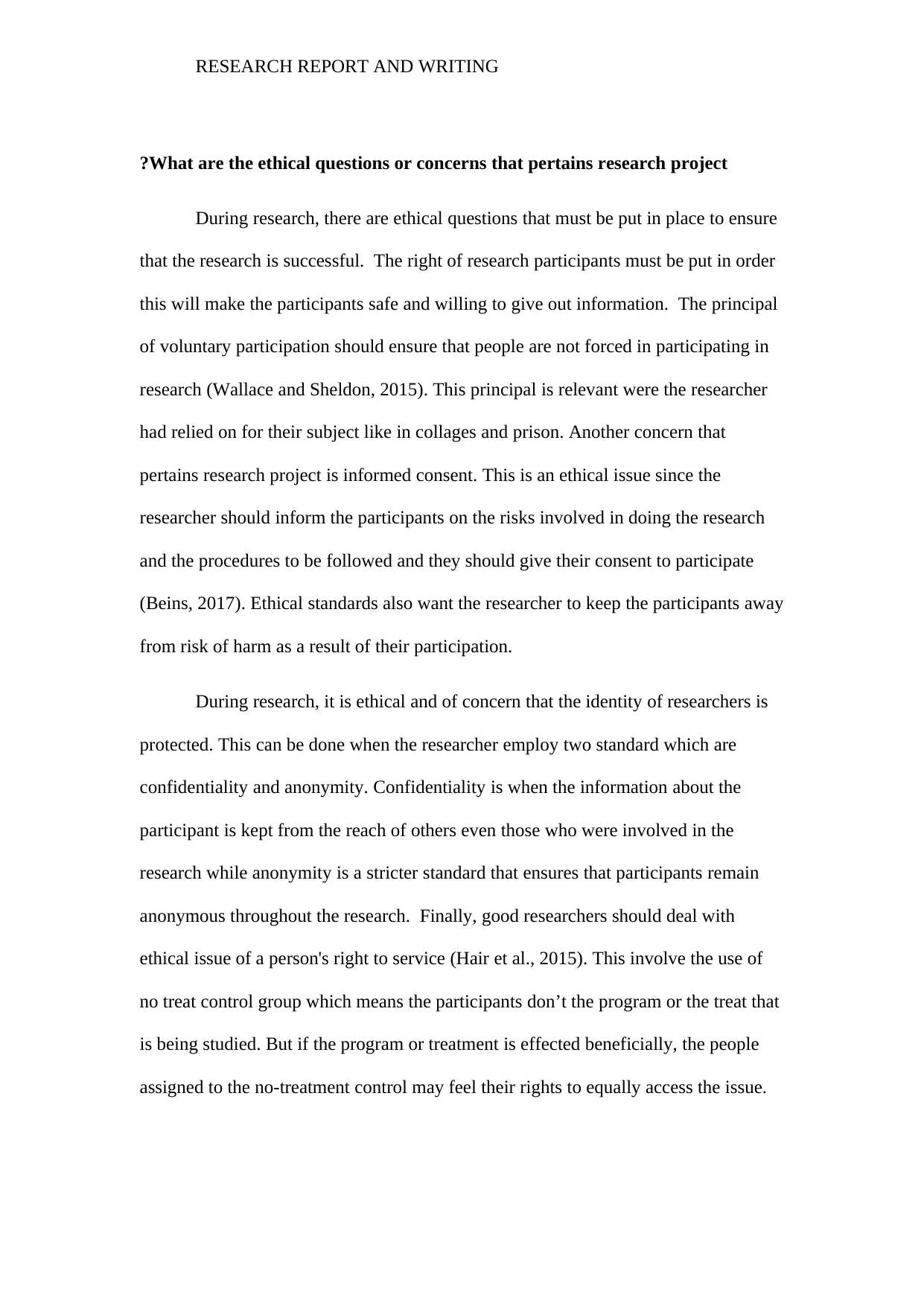
RESEARCH REPORT AND WRITING
What are the ethical questions or concerns that pertains research project?
During research, there are ethical questions that must be put in place to ensure
that the research is successful. The right of research participants must be put in order
this will make the participants safe and willing to give out information. The principal
of voluntary participation should ensure that people are not forced in participating in
research (Wallace and Sheldon, 2015). This principal is relevant were the researcher
had relied on for their subject like in collages and prison. Another concern that
pertains research project is informed consent. This is an ethical issue since the
researcher should inform the participants on the risks involved in doing the research
and the procedures to be followed and they should give their consent to participate
(Beins, 2017). Ethical standards also want the researcher to keep the participants away
from risk of harm as a result of their participation.
During research, it is ethical and of concern that the identity of researchers is
protected. This can be done when the researcher employ two standard which are
confidentiality and anonymity. Confidentiality is when the information about the
participant is kept from the reach of others even those who were involved in the
research while anonymity is a stricter standard that ensures that participants remain
anonymous throughout the research. Finally, good researchers should deal with
ethical issue of a person's right to service (Hair et al., 2015). This involve the use of
no treat control group which means the participants don’t the program or the treat that
is being studied. But if the program or treatment is effected beneficially, the people
assigned to the no-treatment control may feel their rights to equally access the issue.
What are the ethical questions or concerns that pertains research project?
During research, there are ethical questions that must be put in place to ensure
that the research is successful. The right of research participants must be put in order
this will make the participants safe and willing to give out information. The principal
of voluntary participation should ensure that people are not forced in participating in
research (Wallace and Sheldon, 2015). This principal is relevant were the researcher
had relied on for their subject like in collages and prison. Another concern that
pertains research project is informed consent. This is an ethical issue since the
researcher should inform the participants on the risks involved in doing the research
and the procedures to be followed and they should give their consent to participate
(Beins, 2017). Ethical standards also want the researcher to keep the participants away
from risk of harm as a result of their participation.
During research, it is ethical and of concern that the identity of researchers is
protected. This can be done when the researcher employ two standard which are
confidentiality and anonymity. Confidentiality is when the information about the
participant is kept from the reach of others even those who were involved in the
research while anonymity is a stricter standard that ensures that participants remain
anonymous throughout the research. Finally, good researchers should deal with
ethical issue of a person's right to service (Hair et al., 2015). This involve the use of
no treat control group which means the participants don’t the program or the treat that
is being studied. But if the program or treatment is effected beneficially, the people
assigned to the no-treatment control may feel their rights to equally access the issue.
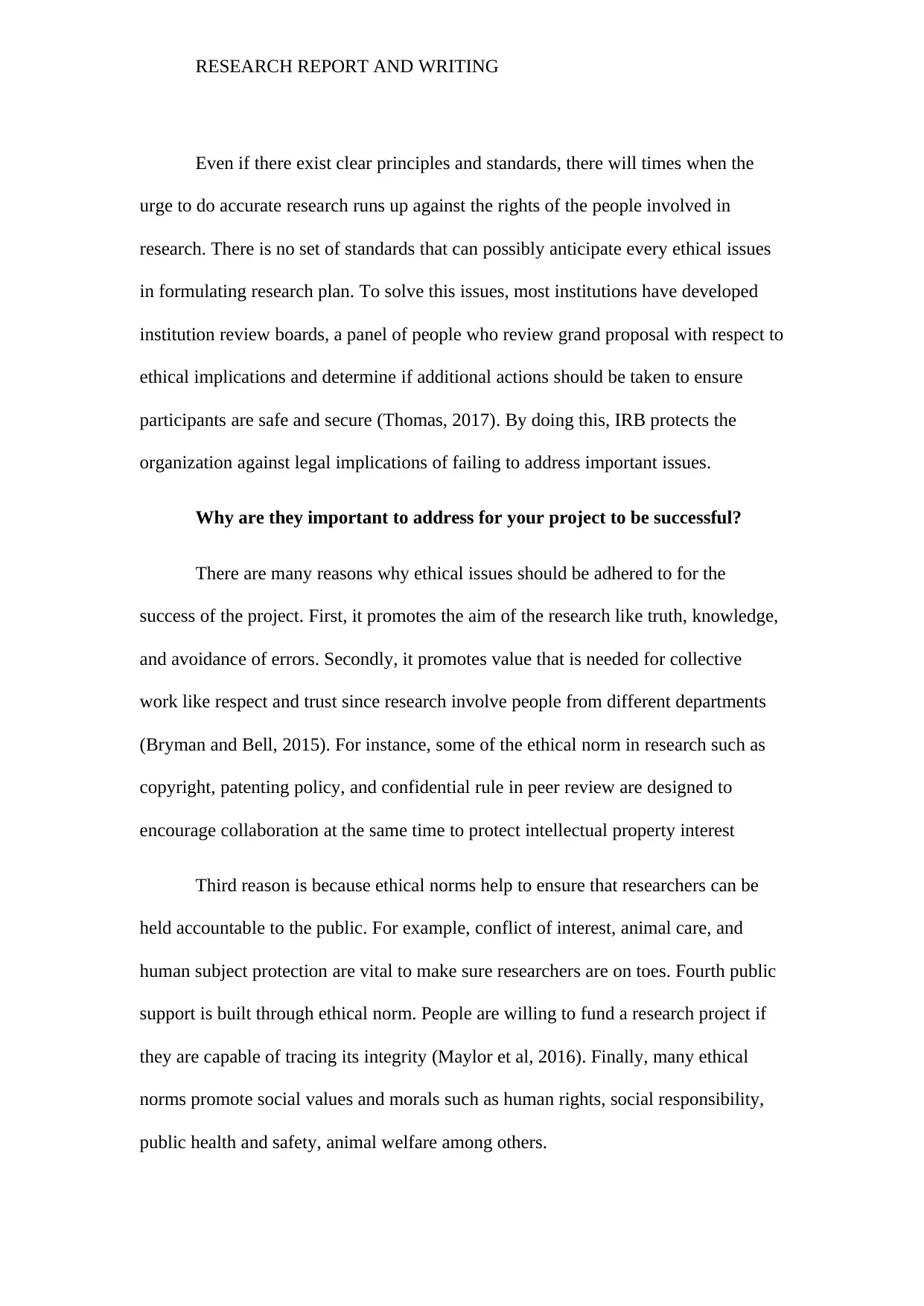
RESEARCH REPORT AND WRITING
Even if there exist clear principles and standards, there will times when the
urge to do accurate research runs up against the rights of the people involved in
research. There is no set of standards that can possibly anticipate every ethical issues
in formulating research plan. To solve this issues, most institutions have developed
institution review boards, a panel of people who review grand proposal with respect to
ethical implications and determine if additional actions should be taken to ensure
participants are safe and secure (Thomas, 2017). By doing this, IRB protects the
organization against legal implications of failing to address important issues.
Why are they important to address for your project to be successful?
There are many reasons why ethical issues should be adhered to for the
success of the project. First, it promotes the aim of the research like truth, knowledge,
and avoidance of errors. Secondly, it promotes value that is needed for collective
work like respect and trust since research involve people from different departments
(Bryman and Bell, 2015). For instance, some of the ethical norm in research such as
copyright, patenting policy, and confidential rule in peer review are designed to
encourage collaboration at the same time to protect intellectual property interest
Third reason is because ethical norms help to ensure that researchers can be
held accountable to the public. For example, conflict of interest, animal care, and
human subject protection are vital to make sure researchers are on toes. Fourth public
support is built through ethical norm. People are willing to fund a research project if
they are capable of tracing its integrity (Maylor et al, 2016). Finally, many ethical
norms promote social values and morals such as human rights, social responsibility,
public health and safety, animal welfare among others.
Even if there exist clear principles and standards, there will times when the
urge to do accurate research runs up against the rights of the people involved in
research. There is no set of standards that can possibly anticipate every ethical issues
in formulating research plan. To solve this issues, most institutions have developed
institution review boards, a panel of people who review grand proposal with respect to
ethical implications and determine if additional actions should be taken to ensure
participants are safe and secure (Thomas, 2017). By doing this, IRB protects the
organization against legal implications of failing to address important issues.
Why are they important to address for your project to be successful?
There are many reasons why ethical issues should be adhered to for the
success of the project. First, it promotes the aim of the research like truth, knowledge,
and avoidance of errors. Secondly, it promotes value that is needed for collective
work like respect and trust since research involve people from different departments
(Bryman and Bell, 2015). For instance, some of the ethical norm in research such as
copyright, patenting policy, and confidential rule in peer review are designed to
encourage collaboration at the same time to protect intellectual property interest
Third reason is because ethical norms help to ensure that researchers can be
held accountable to the public. For example, conflict of interest, animal care, and
human subject protection are vital to make sure researchers are on toes. Fourth public
support is built through ethical norm. People are willing to fund a research project if
they are capable of tracing its integrity (Maylor et al, 2016). Finally, many ethical
norms promote social values and morals such as human rights, social responsibility,
public health and safety, animal welfare among others.
⊘ This is a preview!⊘
Do you want full access?
Subscribe today to unlock all pages.

Trusted by 1+ million students worldwide
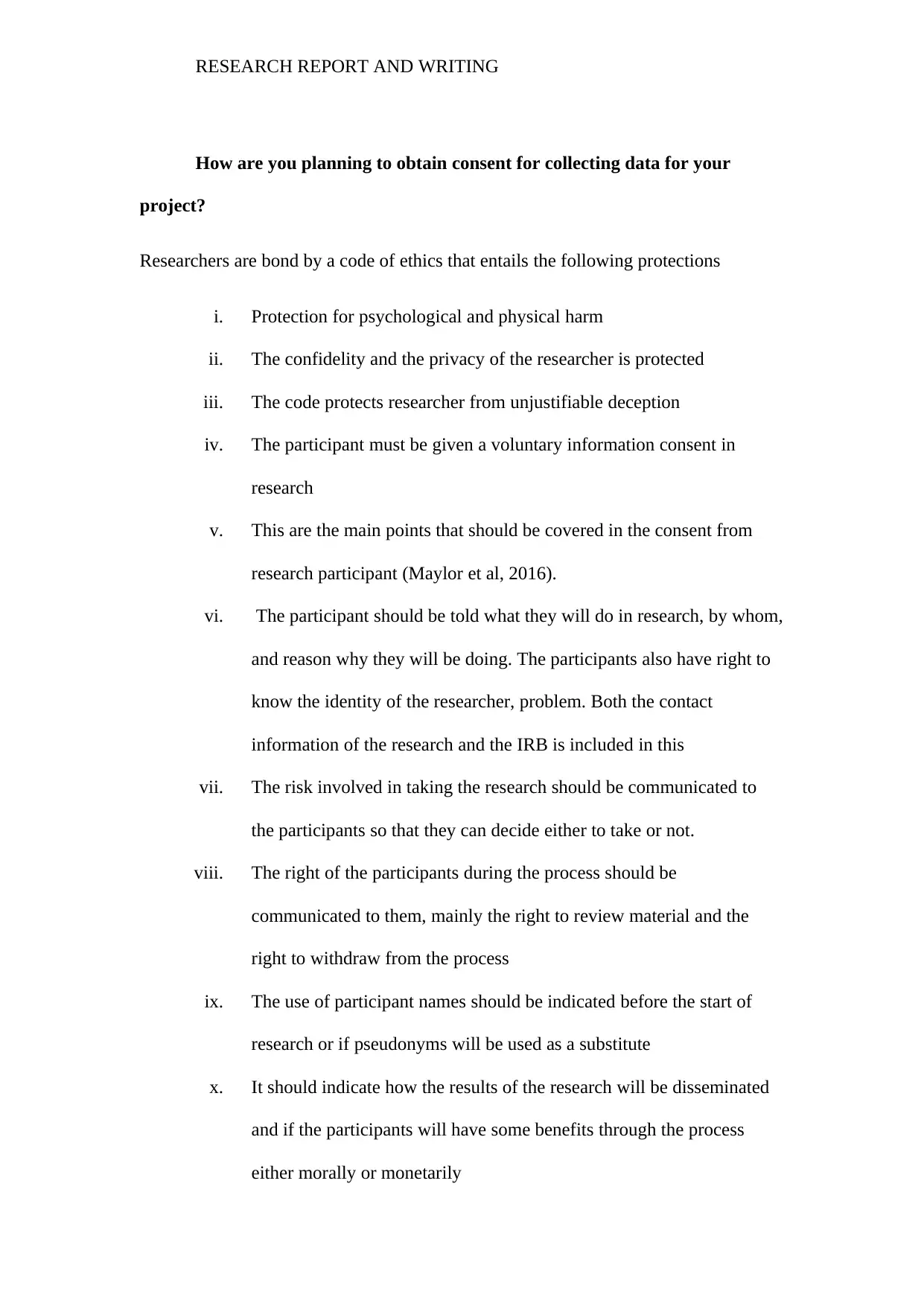
RESEARCH REPORT AND WRITING
How are you planning to obtain consent for collecting data for your
project?
Researchers are bond by a code of ethics that entails the following protections
i. Protection for psychological and physical harm
ii. The confidelity and the privacy of the researcher is protected
iii. The code protects researcher from unjustifiable deception
iv. The participant must be given a voluntary information consent in
research
v. This are the main points that should be covered in the consent from
research participant (Maylor et al, 2016).
vi. The participant should be told what they will do in research, by whom,
and reason why they will be doing. The participants also have right to
know the identity of the researcher, problem. Both the contact
information of the research and the IRB is included in this
vii. The risk involved in taking the research should be communicated to
the participants so that they can decide either to take or not.
viii. The right of the participants during the process should be
communicated to them, mainly the right to review material and the
right to withdraw from the process
ix. The use of participant names should be indicated before the start of
research or if pseudonyms will be used as a substitute
x. It should indicate how the results of the research will be disseminated
and if the participants will have some benefits through the process
either morally or monetarily
How are you planning to obtain consent for collecting data for your
project?
Researchers are bond by a code of ethics that entails the following protections
i. Protection for psychological and physical harm
ii. The confidelity and the privacy of the researcher is protected
iii. The code protects researcher from unjustifiable deception
iv. The participant must be given a voluntary information consent in
research
v. This are the main points that should be covered in the consent from
research participant (Maylor et al, 2016).
vi. The participant should be told what they will do in research, by whom,
and reason why they will be doing. The participants also have right to
know the identity of the researcher, problem. Both the contact
information of the research and the IRB is included in this
vii. The risk involved in taking the research should be communicated to
the participants so that they can decide either to take or not.
viii. The right of the participants during the process should be
communicated to them, mainly the right to review material and the
right to withdraw from the process
ix. The use of participant names should be indicated before the start of
research or if pseudonyms will be used as a substitute
x. It should indicate how the results of the research will be disseminated
and if the participants will have some benefits through the process
either morally or monetarily
Paraphrase This Document
Need a fresh take? Get an instant paraphrase of this document with our AI Paraphraser
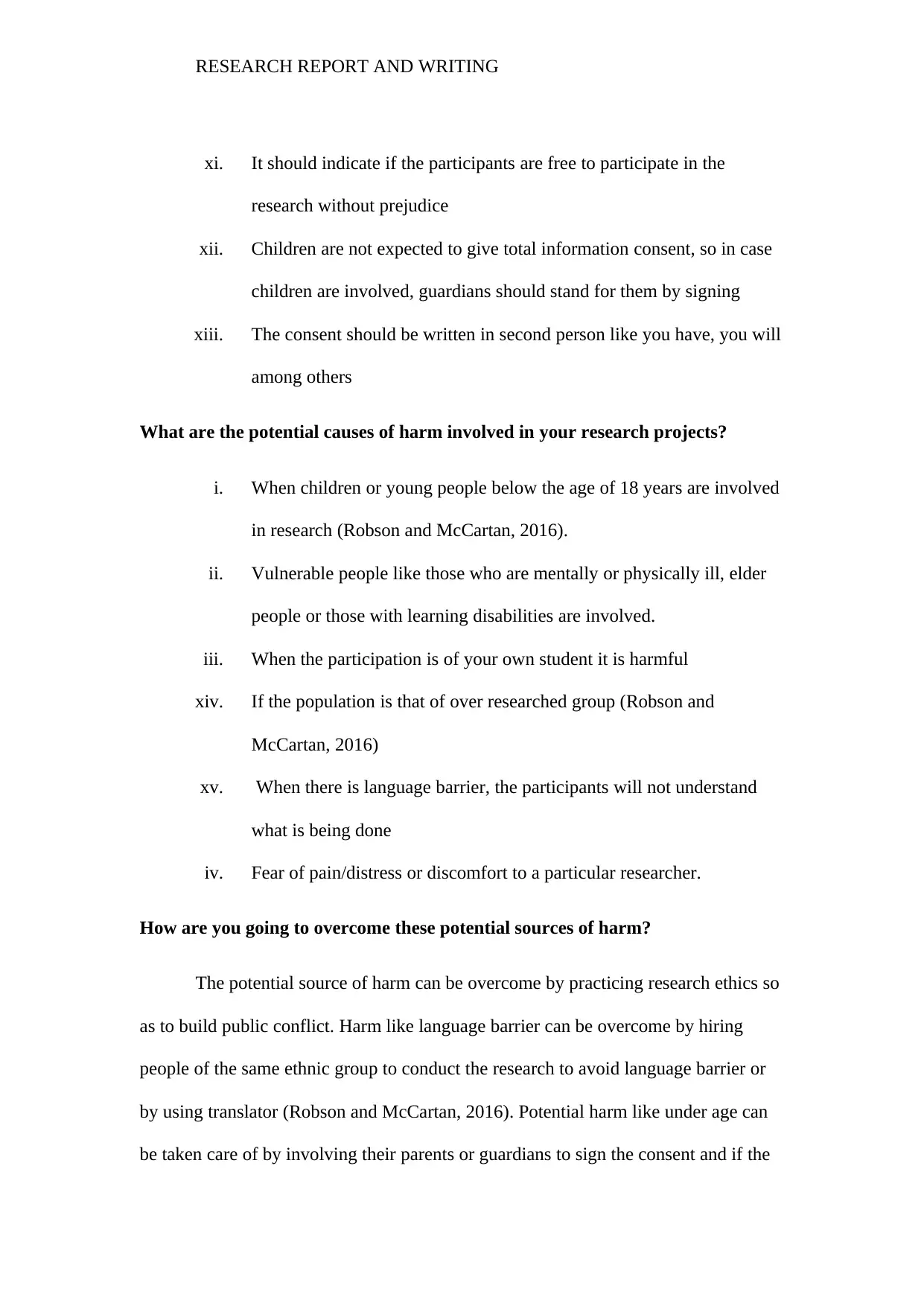
RESEARCH REPORT AND WRITING
xi. It should indicate if the participants are free to participate in the
research without prejudice
xii. Children are not expected to give total information consent, so in case
children are involved, guardians should stand for them by signing
xiii. The consent should be written in second person like you have, you will
among others
What are the potential causes of harm involved in your research projects?
i. When children or young people below the age of 18 years are involved
in research (Robson and McCartan, 2016).
ii. Vulnerable people like those who are mentally or physically ill, elder
people or those with learning disabilities are involved.
iii. When the participation is of your own student it is harmful
xiv. If the population is that of over researched group (Robson and
McCartan, 2016)
xv. When there is language barrier, the participants will not understand
what is being done
iv. Fear of pain/distress or discomfort to a particular researcher.
How are you going to overcome these potential sources of harm?
The potential source of harm can be overcome by practicing research ethics so
as to build public conflict. Harm like language barrier can be overcome by hiring
people of the same ethnic group to conduct the research to avoid language barrier or
by using translator (Robson and McCartan, 2016). Potential harm like under age can
be taken care of by involving their parents or guardians to sign the consent and if the
xi. It should indicate if the participants are free to participate in the
research without prejudice
xii. Children are not expected to give total information consent, so in case
children are involved, guardians should stand for them by signing
xiii. The consent should be written in second person like you have, you will
among others
What are the potential causes of harm involved in your research projects?
i. When children or young people below the age of 18 years are involved
in research (Robson and McCartan, 2016).
ii. Vulnerable people like those who are mentally or physically ill, elder
people or those with learning disabilities are involved.
iii. When the participation is of your own student it is harmful
xiv. If the population is that of over researched group (Robson and
McCartan, 2016)
xv. When there is language barrier, the participants will not understand
what is being done
iv. Fear of pain/distress or discomfort to a particular researcher.
How are you going to overcome these potential sources of harm?
The potential source of harm can be overcome by practicing research ethics so
as to build public conflict. Harm like language barrier can be overcome by hiring
people of the same ethnic group to conduct the research to avoid language barrier or
by using translator (Robson and McCartan, 2016). Potential harm like under age can
be taken care of by involving their parents or guardians to sign the consent and if the
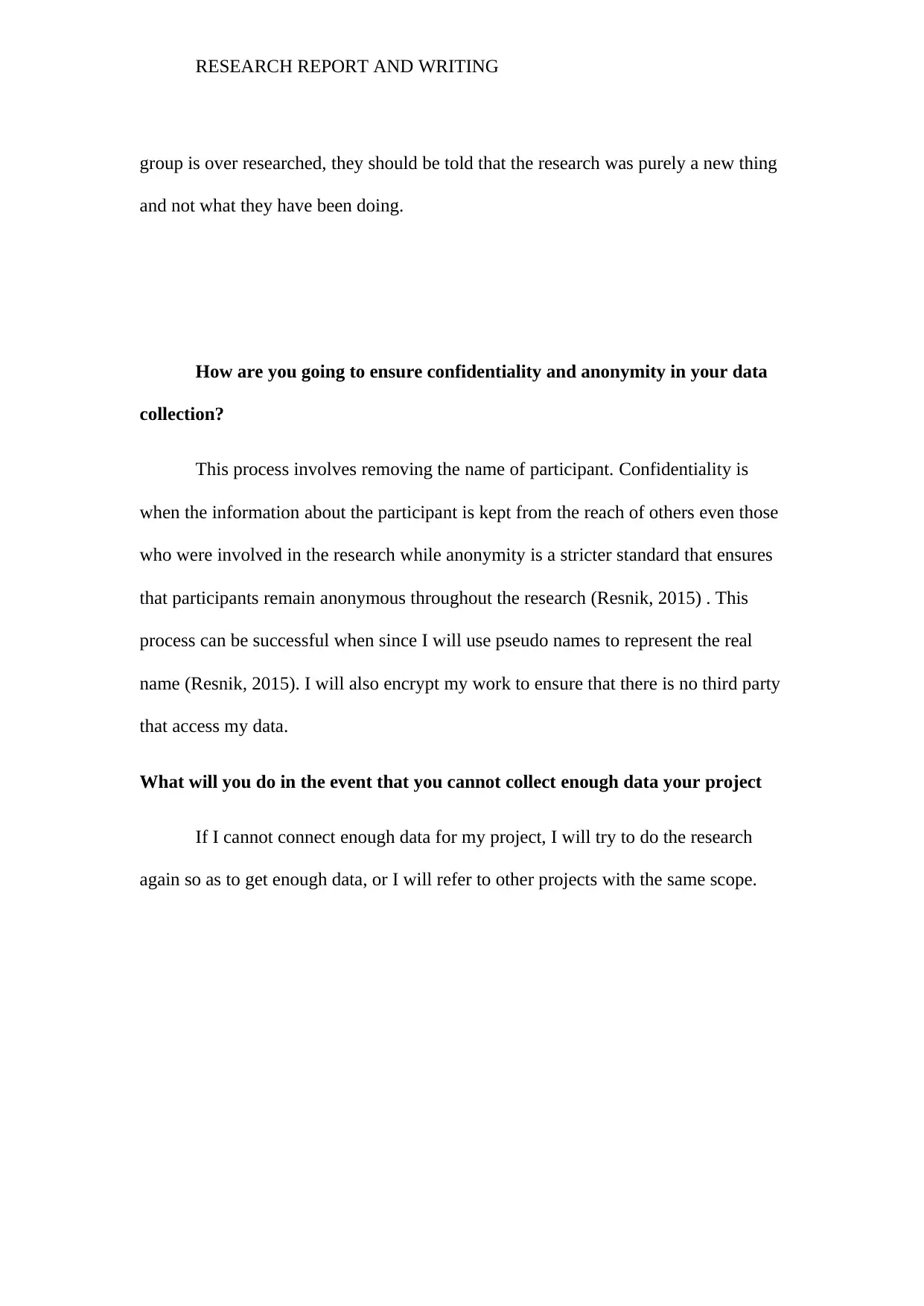
RESEARCH REPORT AND WRITING
group is over researched, they should be told that the research was purely a new thing
and not what they have been doing.
How are you going to ensure confidentiality and anonymity in your data
collection?
This process involves removing the name of participant. Confidentiality is
when the information about the participant is kept from the reach of others even those
who were involved in the research while anonymity is a stricter standard that ensures
that participants remain anonymous throughout the research (Resnik, 2015) . This
process can be successful when since I will use pseudo names to represent the real
name (Resnik, 2015). I will also encrypt my work to ensure that there is no third party
that access my data.
What will you do in the event that you cannot collect enough data your project
If I cannot connect enough data for my project, I will try to do the research
again so as to get enough data, or I will refer to other projects with the same scope.
group is over researched, they should be told that the research was purely a new thing
and not what they have been doing.
How are you going to ensure confidentiality and anonymity in your data
collection?
This process involves removing the name of participant. Confidentiality is
when the information about the participant is kept from the reach of others even those
who were involved in the research while anonymity is a stricter standard that ensures
that participants remain anonymous throughout the research (Resnik, 2015) . This
process can be successful when since I will use pseudo names to represent the real
name (Resnik, 2015). I will also encrypt my work to ensure that there is no third party
that access my data.
What will you do in the event that you cannot collect enough data your project
If I cannot connect enough data for my project, I will try to do the research
again so as to get enough data, or I will refer to other projects with the same scope.
⊘ This is a preview!⊘
Do you want full access?
Subscribe today to unlock all pages.

Trusted by 1+ million students worldwide
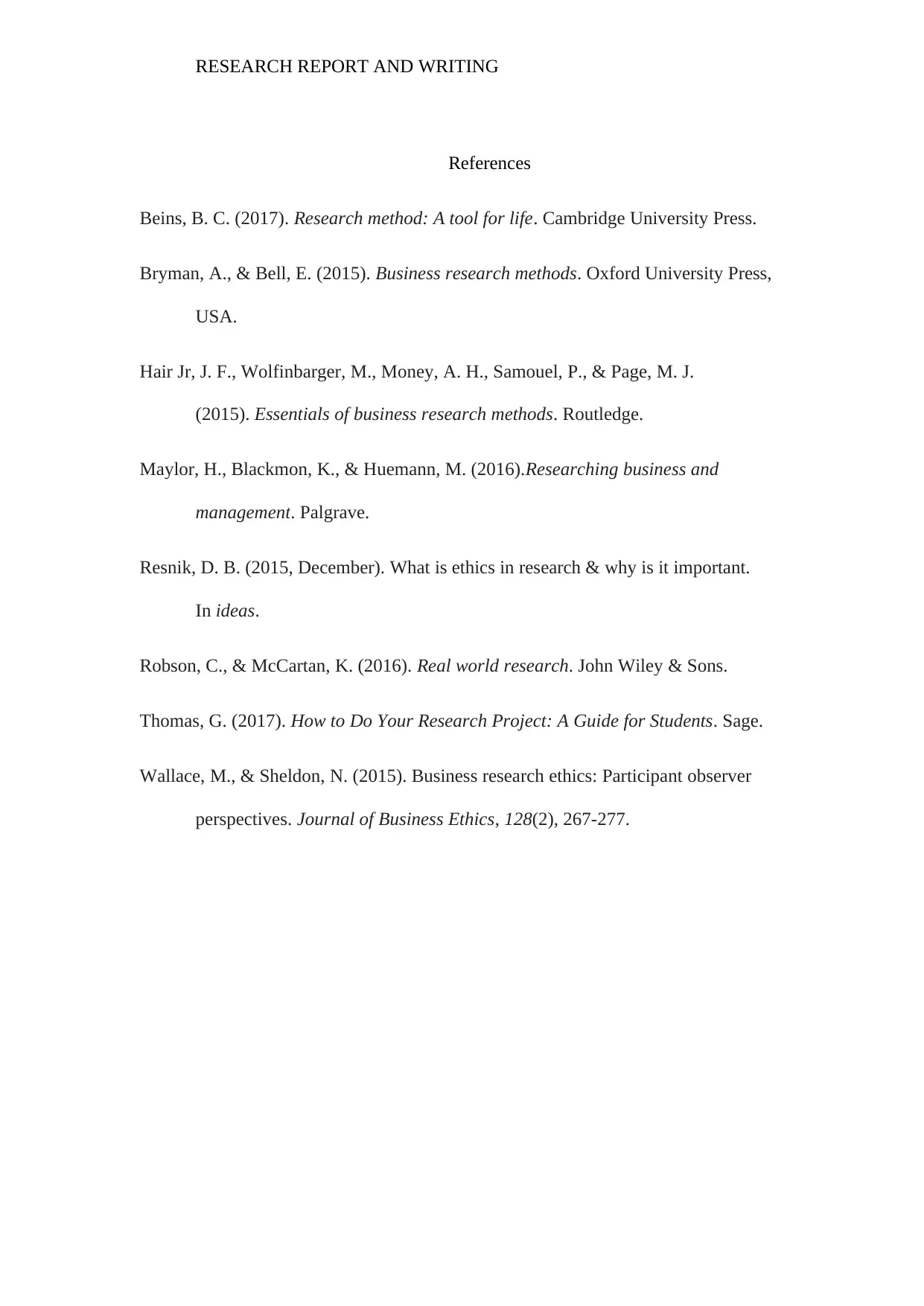
RESEARCH REPORT AND WRITING
References
Beins, B. C. (2017). Research method: A tool for life. Cambridge University Press.
Bryman, A., & Bell, E. (2015). Business research methods. Oxford University Press,
USA.
Hair Jr, J. F., Wolfinbarger, M., Money, A. H., Samouel, P., & Page, M. J.
(2015). Essentials of business research methods. Routledge.
Maylor, H., Blackmon, K., & Huemann, M. (2016).Researching business and
management. Palgrave.
Resnik, D. B. (2015, December). What is ethics in research & why is it important.
In ideas.
Robson, C., & McCartan, K. (2016). Real world research. John Wiley & Sons.
Thomas, G. (2017). How to Do Your Research Project: A Guide for Students. Sage.
Wallace, M., & Sheldon, N. (2015). Business research ethics: Participant observer
perspectives. Journal of Business Ethics, 128(2), 267-277.
References
Beins, B. C. (2017). Research method: A tool for life. Cambridge University Press.
Bryman, A., & Bell, E. (2015). Business research methods. Oxford University Press,
USA.
Hair Jr, J. F., Wolfinbarger, M., Money, A. H., Samouel, P., & Page, M. J.
(2015). Essentials of business research methods. Routledge.
Maylor, H., Blackmon, K., & Huemann, M. (2016).Researching business and
management. Palgrave.
Resnik, D. B. (2015, December). What is ethics in research & why is it important.
In ideas.
Robson, C., & McCartan, K. (2016). Real world research. John Wiley & Sons.
Thomas, G. (2017). How to Do Your Research Project: A Guide for Students. Sage.
Wallace, M., & Sheldon, N. (2015). Business research ethics: Participant observer
perspectives. Journal of Business Ethics, 128(2), 267-277.
1 out of 7
Related Documents
Your All-in-One AI-Powered Toolkit for Academic Success.
+13062052269
info@desklib.com
Available 24*7 on WhatsApp / Email
![[object Object]](/_next/static/media/star-bottom.7253800d.svg)
Unlock your academic potential
Copyright © 2020–2026 A2Z Services. All Rights Reserved. Developed and managed by ZUCOL.




